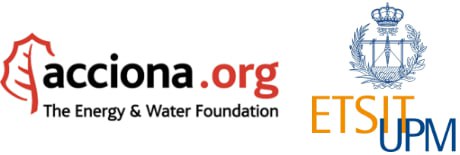PROJECTS
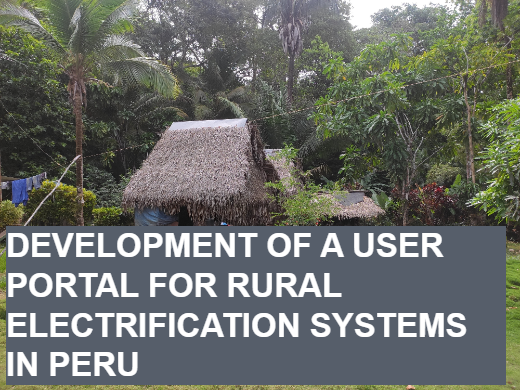
Project: Towards social inclusion: development of a user portal for rural electrification systems in Peru
Where: Amazonía, Perú
This project is carried out in collaboration with the acciona.org Foundation and its partner organization in Peru, and is part of the Proyecto Semilla UPM 2023; with the objective of facilitating the electrification of rural areas in the Departments of Cajamarca and Loreto. Peru is a pioneer in rural electrification through isolated solutions and has a regulation that establishes certain requirements when electrifying these areas.
The creation of a user portal will facilitate compliance with the regulation and provide users with a means of communication with which to control all aspects of their electricity supply, from quota management to failure notification. This intervention will serve as a learning experience for future projects in other areas of Latin America where, as in Peru, electrification rates in rural areas are less than 85%.
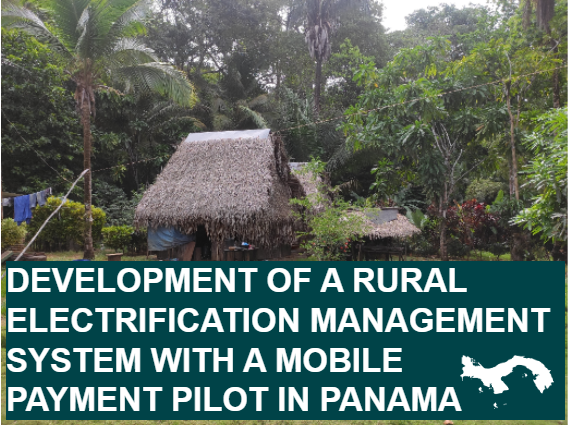
Project: Development of a rural electrification management information system with a mobile payment pilot in Panama
Where: Ngäbe-Buglé, Panamá
Throughout this project (Semilla UPM 2022), an information system will be developed that will allow the acciona.org Panama team to manage the operational aspects of the energy access intervention in a more efficient and standardized way. To achieve this objective it will be necessary to conduct a thorough analysis of the processes and tasks of the organization, the technical capabilities of each agent involved and the needs of the users in the region.
Thanks to the experience of the three partners collaborating in the project, it will be possible to have a complete vision of the requirements, from the global point of view (acciona.org), of the daily operations (acciona.org Panamá) and of the technology (UPM). This intervention will serve as a learning experience for future rural electrification projects and will therefore be designed at all times trying to create a standard solution adaptable to other models.
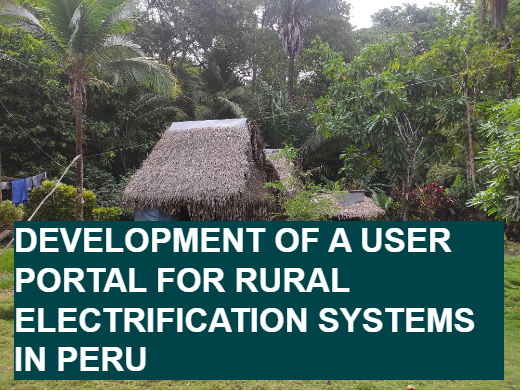
Project: Development of a user portal for rural electrification systems in Perú
Where: Amazonía, Perú
This project is carried out in collaboration with the acciona.org foundation and its partner organization in Peru with the objective of facilitating the electrification of rural areas in the Departments of Cajamarca and Loreto. Peru is a pioneer in rural electrification through isolated solutions and has a regulation that establishes certain requirements when electrifying these areas.
The creation of a user portal will facilitate compliance with the regulation and provide users with a means of communication with which to control all aspects of their electricity supply, from quota management to failure notification. This intervention will serve as a learning experience for future projects in other areas of Latin America where, as in Peru, electrification rates in rural areas are less than 85%.
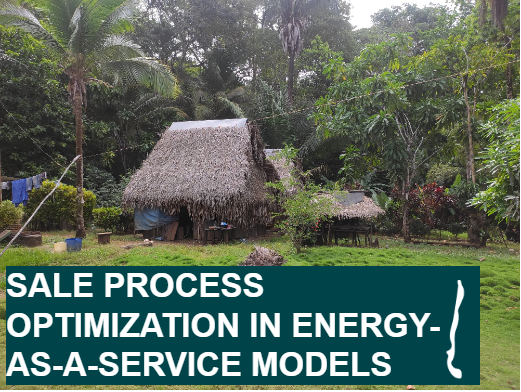
Where: Coquimbo, Chile.
This project digitizes the invoicing process by automating the transfer of information between organizations to optimize the process and avoid manual tasks. To this end, an analysis of the data required by the local partner, that acts as the point of collection of fees and delivery of the unlock codes, has been carried out.
This reduction of manual work has allowed the team to spend less time on routine tasks, to have available resources to identify new needs and expand its area of action to other communities without foreseen energy access.
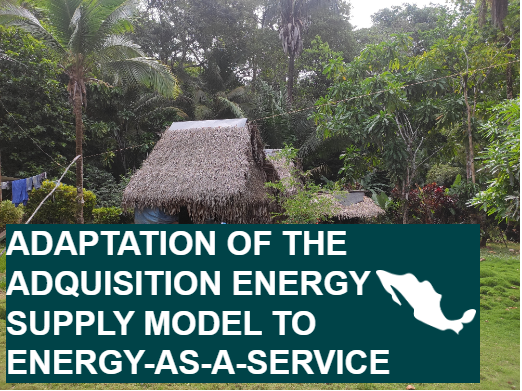
Where: Oaxaca, México.
As a result of a previous project, in which we diagnosed the improvements found in the energy supply project of Fundación acciona.org in Oaxaca (Mexico), we decided to migrate the current model of the project to an Energy-as-a-Service model. This change required a complete adaptation of its processes both at the level of tasks and technological systems.
In this project, the needs of the new model were studied and the existing processes were adapted to the requirements of the Energy-as-a-Service model. The adaptation had to be carried out efficiently and trying to minimize changes in order to facilitate the learning curve of the project managers and operators.
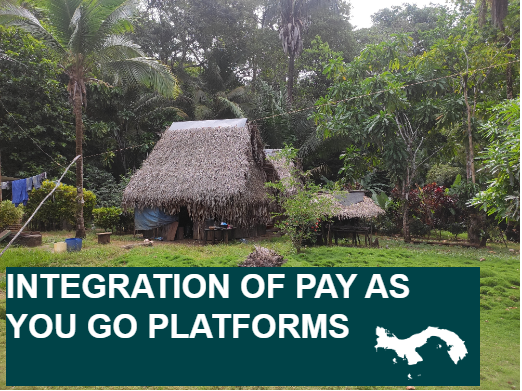
Where: Ngäbe Buglé, Panamá.
As a consequence of the diversity of energy suppliers in the isolated PV market, the handling of the different Pay-as-you-Go management platforms is becoming increasingly complex for institutions such as acciona.org. The learning curve for this type of software is quite slow, and with more and more different systems being used, errors are noticeable.
In this context, we have developed a system in which different PAYG systems can be integrated, allowing companies to become independent from suppliers and simplify the tasks of code generation for PAYG systems. This project has been implemented in Ngäbe Buglé and once it has passed the testing phase, it is intended to be transferred to the rest of the foundation’s projects.

Where: Ngäbe Buglé, Panamá.
Sale management in rural electrification projects developed in the last mile is a challenge for the economic sustainability. Fees must be collected, accounted and recorded in the management systems. These tasks are usually manual and therefore often lead to errors in the accounting of the suppliers.
In order to streamline these tasks and ensure the correct collection and recording of quotas in the foundation’s project in Ngäbe Buglé, Panama, this project was carried out. During its execution, each process is analyzed with the different agents involved in order to determine which tasks are the costliest and in which tasks more mistakes are made. Once the diagnosis was done, we developed a digitalization solution for the three main tasks: biweekly reports of sales, identification of users pending payment and registration in the system of collections received.
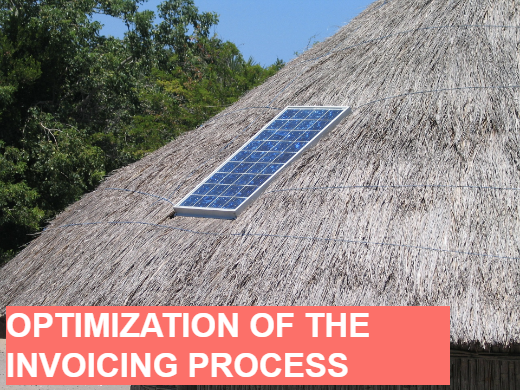
Where: Cajamarca, Perú.
According to the regulations of the Peruvian Tax Agency, a series of requirements must be followed when generating the invoices of the energy beneficiaries, in order to access the subsidy offered by the Peruvian State.
In this project we have digitalized the billing process by automating the uploading of all the beneficiaries’ information to optimize the process and avoid these manual tasks. To do this, we have performed an analysis of the processes involved in the task and have automated the download of data from the CRM Salesforce system in the appropriate format and with the exact conditions required by the Peruvian Tax Agency.
This reduction of manual work has allowed the team to spend less time on routine tasks (reduction of 93.75% of the hours invested in the process) and to have more resources available for field work, identifying new needs, training entrepreneurs and beneficiaries and expanding its area of action to other communities with no foreseen access to energy.
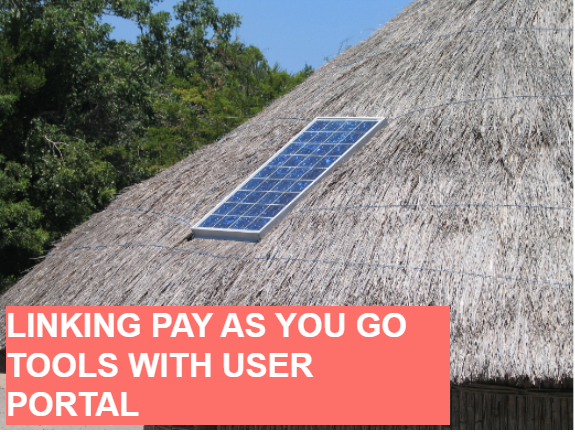
Where: Cajamarca, Perú.
The Energy-as-a-Service model in Peru requires that both the regulator and the users can access information related to the service provided and report faults and incidents through a website. After developing a tool to meet the requirements, the Chair’s team focused on supporting the tool to ensure that the data extraction was done correctly.
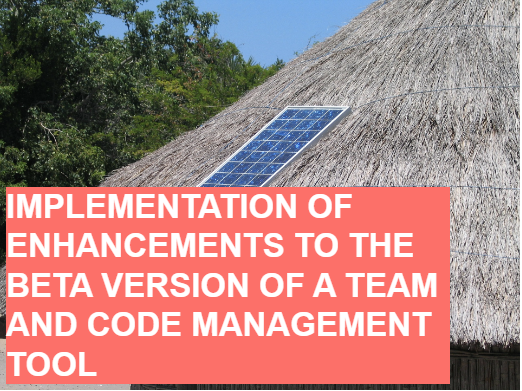
The management of equipment and the generation of Pay-as-you-Go codes is currently carried out at Fundación acciona.org through a tool specifically designed for this purpose in collaboration with UPM, giving the projects operational and economic independence with respect to the suppliers of their photovoltaic systems.
After a year of using the tool, a usage analysis has been carried out, user experiences have been compiled and points for improvement have been identified.
In this project, the improvements collected in the analysis have been implemented, facilitating the operability of the business and the usability of the processes within the tool.
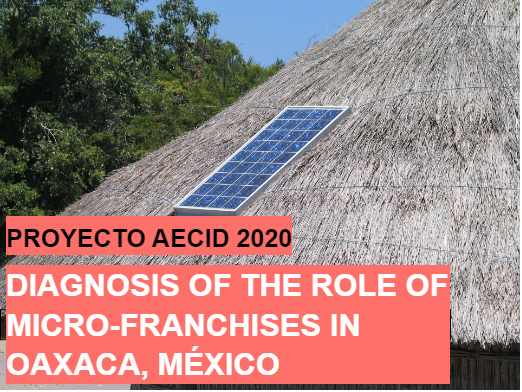
Where: Oaxaca, Mexico.
Acciona.org has been working in Oaxaca since 2012, when the first project was implemented through a pilot in the area using photovoltaic systems to provide energy access to communities with no access. Following the implementation of the pilot, five projects have been carried out over the last few years, reaching more beneficiaries up to a total of 8,500 systems distributed throughout the state. In order to facilitate management and communication with these users, nine “luz en casa” centers have been set up throughout the country to create points of reference to which users can go to resolve doubts, breakdowns or make new contracts.
In order to promote the figure of these centers, a project is proposed to analyze the current model of micro-franchises, both economically and operationally, to evaluate the tools they use and the functions they perform in their one day at a time work.
In this project, the Chair’s team traveled to Oaxaca on a field mission to learn first-hand about the activities and operation of Acciona Mexico and its microfranchisees. To prepare for the mission, a survey was designed to collect the opinion of the beneficiaries of the different projects, in order to have a diagnosis of the situation before the field visit, and the information collected was processed using data visualization tools that made the mission more productive.
As a result of the project, an accurate diagnosis of the project’s status was obtained and actions were proposed to enhance the project’s strengths and correct its weaknesses.
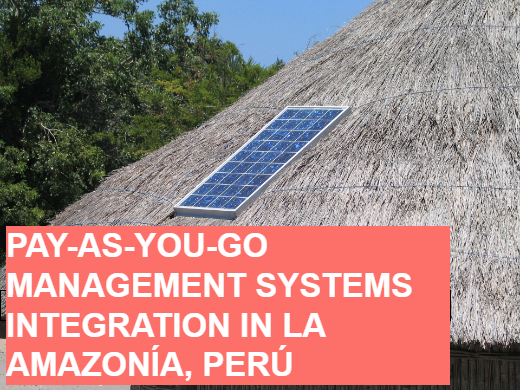
Where: Amazonía, Perú.
In the Peruvian Amazon, the foundation has carried out three small-scale projects since 2016 with the objective of bringing energy to very isolated areas near the Napo River. In these projects, different suppliers of photovoltaic systems have been used, points of improvement have been discovered and solutions have been adapted to the needs detected. This has resulted in a mosaic of different hardware systems running at the same time and different software associated with the equipment coexisting in the same technological ecosystem.
This situation provokes an extra investment of resources to unify the information collected in the systems that support the management of the operation, in order to introduce all the information in the invoicing tool to comply with the requirements of the Peruvian authorities.
In this project we have worked to automate the downloading of data from each system in order to unify the information. The digitalization of this process makes possible to avoid manual tasks and the invoicing process more efficient, leaving more room for more enriching work for the project and for the communities in the area.
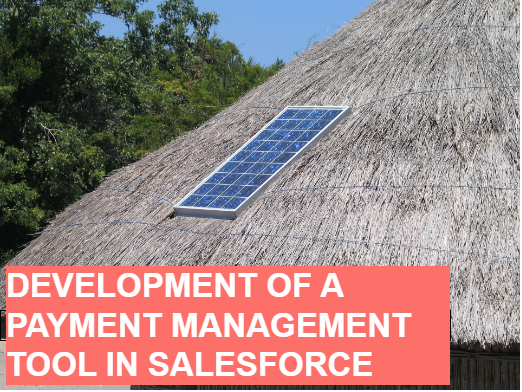
Where: Cajamarca, Perú
Acciona Peru is a pioneer in the projects of Fundación acciona.org, it implemented the energy access project in Cajamarca through a second generation photovoltaic systems. The service model consists of a model of installments to be paid monthly by the beneficiaries. In case of non-payment, the equipment is removed to prevent further use.
In this project, an a pplication is developed in Salesforce to modify the status of payments and collection dates of the beneficiaries. A simple and usable view is designed and implemented, so users can filter by name and location and apply status modifications to selected items.
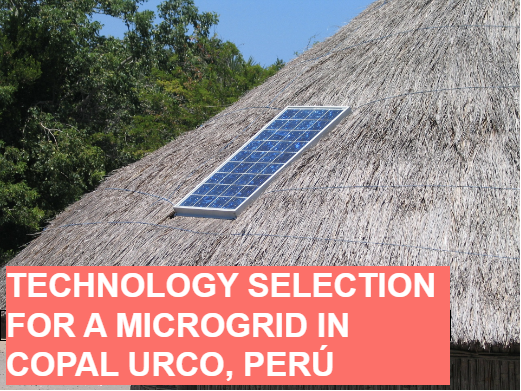
Where: Copal Urco, Perú
In the context of access to energy in isolated areas, there are different options to provide it. One of them is the microgrid, which allows implementing Energy-as-a-Service models in areas far from the conventional grid, but where there are several houses close to each other. In order to analyze the viability of this model, the foundation has developed a pilot project in the Copal Urco community with 40 units connected by smart meters.
In this project the team of the Chair has advised on the selection of suppliers at the level of photovoltaic systems and specific management software to communicate with smart meters.

Where: Coquimbo, Chile
The Energy-as-a-Service model can be implemented through Pay-as-you-Go systems that are integrated into photovoltaic modules. These systems make possible to provide energy to isolated areas where regular access is difficult due to the orography of the area, the distance between urban areas or the economic resources needed to travel. These systems operate by means of codes that are acquired periodically to provide electrical service to the equipment.
The management of the equipment and the generation of Pay-as-you-Go codes is carried out using the proprietary software of the suppliers of the photovoltaic system used in each project. The use of proprietary software implies annual license costs that also increase depending on the number of users. In this project, the Chair developed a tool that allows generating the codes independently from the hardware suppliers, significantly reducing the project costs and therefore the costs of access to electricity for the users.
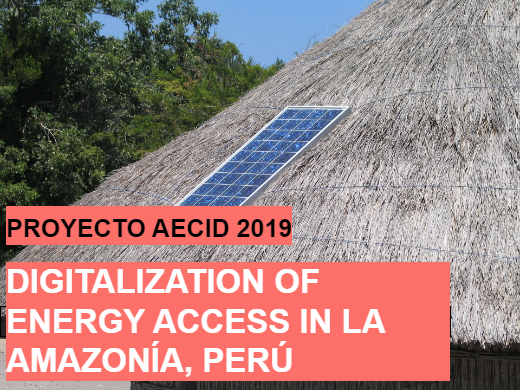
Where: Amazonía, Perú
Acciona.org uses Pay-as-you-Go technology systems in most of its projects located in remote areas. These systems make possible to provide energy access to isolated areas where regular access is complex, either due to the orography of the area, the distance to more urban areas or the economic resources required for travel. These systems operate by means of codes that are acquired periodically to provide electrical service to the equipment.
The management of the equipment and the generation of Pay-as-you-Go codes is carried out using the software of the suppliers of the photovoltaic system used in each project. All these softwares imply annual costs in licenses that also increase depending on the number of users.
This project wanted to support Fundación acciona.org in theor last project implemented. 1,200 new photovoltaic equipments were installed, to determine which technological option would best suit their needs and their plans for future scalability. They chose a Pay-as-you-Go system provider which includes a code generation algorithm in order to develop their own tool for equipment and code management, thus avoiding annual licensing costs. With this decision, acciona.org reduces the operational risks by disassociating itself from the dependence on external companies during the entire project operation period.
As a result of the project, the code management tool was implemented in the Peruvian projects, simplifying operations and costs.
